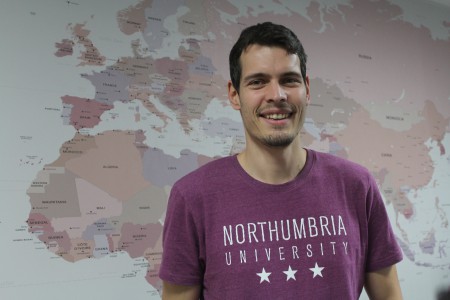At the turn of November and December the Second Faculty’s website editor Dr. Petr Andreas spent a week and half at the Communication and Marketing Department at Northumbria University, Newcastle. The following is a short essay about his experience.
Before the Departure

The Communications Department at the Second Faculty of Medicine, Charles University, was established only two years ago and is still very young. So I decided to apply for an internship abroad, with the support of the Erasmus+ programme, and learn something from the best, i.e. from professionals who have been working in the field for much longer than we have.
Northumbria University was on my shortlist as it is located in the UK (so I’d be able to communicate); it cooperates with Charles University, teaches medical courses and has a splendid web presence. Last but not least, the kind people working there were willing to host me and prepare an extensive daily programme to keep me busy.
After my first contact with the helpful Erasmus+ coordinator at Northumbria I started to fill in a whole series of forms, most of which were new to my colleagues, so I really appreciated both my faculty coordinator’s and especially the university coordinator’s help. Educational trips for Erasmus+ employees have two aspects to deal with: the Erasmus aspect itself, and also the faculty aspect (a business trip), both of which are relatively independent of each other
At the internship
I arrived in Newcastle on a direct flight from Prague. I stayed in the Claude Gibb Student Hall, which was located directly on campus, roughly three minutes walk from the building where I was training.
Northumbria University is a relatively young university and expends a lot of effort to perfect its marketing, which was of great interest for me. The Communication and Media Department where I was doing my internship employs 120 people on its own!
My colleagues from Northumbria prepared a really substantial programme for me. I spent every day with one team in their cubicle in the open-plan office. Altogether I talked with about thirty people who take care of specific promotional and marketing aspects of the university: the website, prospectus, alumni, recruitment, social media, reports and interviews. I attended a photo-shoot, visited the printing house and graphical studio, and took part in some meetings. I met specialists in everything that more or less belongs within my remit at our faculty. Everyone was very nice and patiently explained their daily routine to me; I felt most welcome. I was very glad, then, to be able to make a contribution of my own with a little editing help on the university website. It came as no surprise that I had a bit of brain-ache in the evenings after several 30–60 minute conversations every day.
 I often strolled around the city centre in the evenings. It is a pity that dusk in the North of England comes so early; whenever I made it to the seaside after work, I could see only the lights of a lighthouse and the offshore oil platforms. Newcastle’s dominant feature is a huge bridge over the River Tyne, and when lit up it is extraordinarily impressive.
I often strolled around the city centre in the evenings. It is a pity that dusk in the North of England comes so early; whenever I made it to the seaside after work, I could see only the lights of a lighthouse and the offshore oil platforms. Newcastle’s dominant feature is a huge bridge over the River Tyne, and when lit up it is extraordinarily impressive.
At the very end of my internship there was a Christmas ball, the Snow Ball, which we would probably call a disco in this country. It was a great event with dancing and friendly conversations over a glass or two of cider – a great way to finish off my stay, if I don’t count a little weekend travelling across Scotland.
After return
The benefits of my stay have far exceeded my expectations. I brought back thirty pages of notes and plenty of prints, photographs and screenshots, as well as a strong feeling that I have given my career an extra boost.
In view of the fact that the Erasmus+ employee programme is so beneficial, it is a great shame that it is not being used more. I would recommend an internship of this kind to everyone who wants to start doing any activity at their university that has not yet been established in this country.













